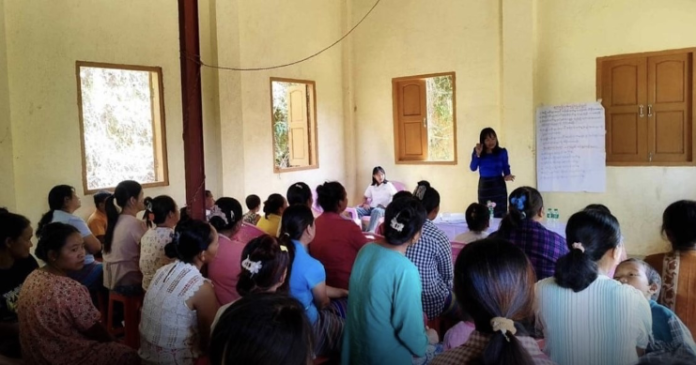An interview with Nan Awan Kham, advisor to the Myanmar-Women, Peace and Security about the situations of women from different regions, who are facing sexual violence during the armed conflict.
According to a statement from the Myanmar Women, Peace and Security (M-WPS), women who have been subjected to sexual violence as a weapon by the military council are striving for justice by disclosing records and data to support their cases.
In addition, M-WPS organized a two-day online discussion in the last week of October, focusing on the state of women’s peace and security in Myanmar amid the ongoing crisis since the coup.
Following the discussion, M-WPS issued an 11-point statement addressing issues related to women, peace, and security.
The Independent Mon News Agency (IMNA) interviewed Nan Awan Kham, advisor to the Myanmar-Women, Peace and Security about the situation of women in various regions who are subjected to sexual violence, as well as the key points outlined in the M-WPS statement.
Q: Can you provide a brief overview of the current situation concerning women’s safety and security during this conflict?
A: The lives of Myanmar women have never been safe, and since the military coup in 2021, both the judicial and administrative systems have collapsed. They feel both physically and psychologically insecure, as arbitrary arrests have become more frequent. Women who stand up for the truth feel insecure about themselves, their families, and those around them.
Q: How are women, particularly ethnic women, targeted for sexual violence?
A: It is hard to provide precise details, as the situation makes it challenging to collect data on a national scale. The terrorist army has been committing war crimes by using sexual violence against women as a weapon of war. The terrorist army has targeted ethnic women in conflict areas, and there are sexual assaults when they are unjustly arrested and interrogated. During this period, accessing justice for women is a big challenge, whether within the country, in revolutionary areas, in places where they are temporarily seeking refuge, or even abroad. Taking advantage of this situation, some men are committing domestic violence and sexual assault, claiming that their spouses, partners, and lovers have no recourse to file complaints anywhere. These cases are taking place everywhere. We have heard some cases of sexual violence committed by members of the revolutionary forces. But the ethnic revolutionary groups are taking actions with their own legal system.
Q: How has the situation regarding this violence changed from year to year?
A: According to surveys conducted by the MoWYCA (Ministry of Women, Youth and Children Affairs), AAPP (Assistance Association for Political Prisoners), and BWU (Burmese Women’s Union), reports of sexual assault, extrajudicial killings, arbitrary arrests, torture, and the death penalty by the military council have been increasing each year. Additionally, the number of internally displaced persons (IDPs) and those fleeing the country has also risen significantly.
Many young people have been fleeing to neighboring countries to escape the military council’s conscription law. There is no safety for either those who leave legally or those who attempt to flee illegally overland.
Meanwhile, as people struggle to make a living in the country, social issues like drug abuse, human trafficking, and the spread of sexually transmitted diseases have surged.
Q: Who is currently taking action to seek justice for the affected women, and what steps are being taken on their behalf?
A: Women’s groups are collaborating closely, forming strong affiliations wherever possible. When ethnic women’s groups in local areas receive complaints, they coordinate with the judiciary of the relevant ethnic armed groups. Additionally, we are working in partnership with the women’s, defense, home affairs, and judicial departments of the National Unity Government (NUG). However, local groups are highly conscious of their own security and are contributing by maintaining a low profile. There are hotlines available where individuals can speak openly and file complaints. From there, we assist in connecting them with the relevant groups if they require temporary shelter. We also offer support to those seeking to file complaints in their pursuit of justice.
We are gathering information and submitting it to the Independent Investigative Mechanism for Myanmar (IIMM) to support the pursuit of transitional justice in the future, particularly as immediate action against the military council’s actions remains challenging. Women’s networks are collaborating on long-term initiatives, including assisting in the development of policies to address violence effectively, organizing leaders, and ensuring that revolutionary members adhere to a code of conduct and shared principles.
During the revolutionary period, we must place special emphasis on our security, which results in many limitations when it comes to working towards justice.
Q: According to the M-WPS statement, the military council is exploiting women as weapons of war. How are they being used in this manner?
A: It refers to the deliberate use of rape as a weapon of war against women in conflict zones. the military council has been employing this tactic for over 70 years.
Q: Finally, what steps will M-WPS take next to ensure the safety and justice of women?
A: M-WPS is actively running awareness programs focused on women’s peace and security. We are providing technical assistance in drafting laws and policies aimed at preventing violence against women. Additionally, we are engaging with leaders to encourage support for these efforts. We advocate for supporting survivors of violence through a Survivor-Centered Approach and consistently call for accountability, ensuring that those responsible for such violence are never exempt from punishment. We will respect and value women, and work to enhance their capabilities and empower them with the opportunity to perform. Only in an environment free from violence can women live in safety.
Sent by IMNA

